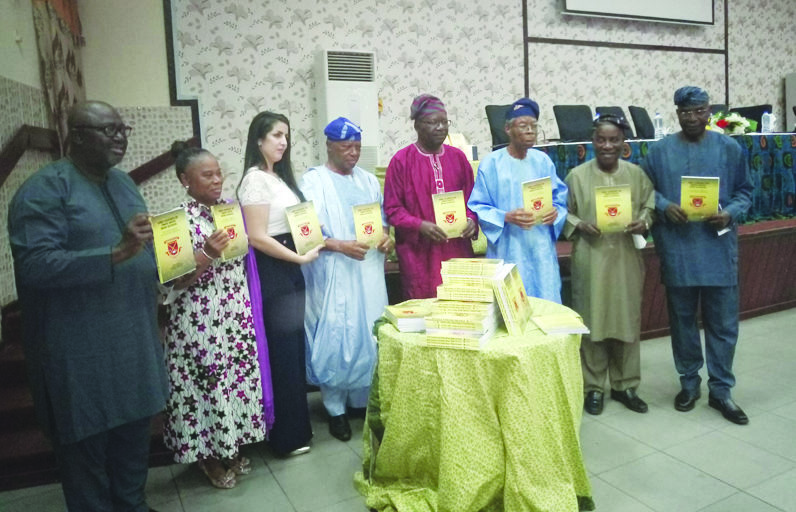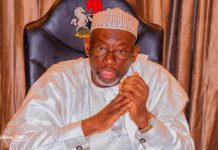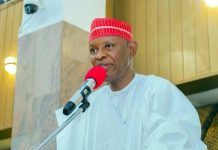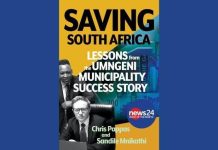THE fanfare that heralded the celebration of 100 years of Ondo Boys High School seemed noble, and a sign of great achievement. However, past students and guests at the occasion of the public presentation of the book titled: One Century of Ondo Boys’ High School: The History of Nigeria’s First Community High School, could not help but lament over the deplorable state of education now. This is as they reminisce the good old days of quality education void of religious and ethnocentric colouration.
*Prof. Ropo Sekoni, 2nd right, and guests at the public presentation of One Century of Ondo Boys’ High School:The History of Nigeria’s First Community High School, at NECA House, Ikeja, Lagos.
At the official launch recently in Lagos, the book, a 174-page glossy compendium authored by the trio of Prof. Ropo Sekoni(1962 set), a retired Professor of English and Comparative Literature at Lincoln University, USA, and columnist of The Nation Newspapers, Prof. Festus Adesanoye (1963 set) and Dr Orobola Fasehun(1964 set) and foreword by Amb. Tayo Ogunsulire, set of 1947 who doubled as the Chairman of the occasion; chronicles the history, development, challenges and landmark achievements of former students of the school.
Prof. Sekoni in his speech titled: Rebooting secondary education: lessons from history of Ondo Boys’ High School, said: “Most of the values relevant to the promotion of education 100 years ago in Ondo and other Nigerian communities do not seem to exist today. These values include commitment to acquisition of new knowledge to deal with new reality; to commitment to egalitarianism or ensuring that people enjoy the same results or outcomes, i.e provision of equality of opportunities and equity or fairness to all; to preoccupation of providers of education with inevitability of adequate infrastructure to meet the needs of teachers and learners; to commitment of quality assurance or high standards: and belief in the positive impact of local management of education to motivation of teachers, staff and students with respect to sustaining standards of education.”
Tracing the failing standard of education to the proposition of free secondary education by the government in 1979 and the earlier introduction of free primary education, the Professor of repute noted that “The good intentions behind introduction of free secondary education changed the landscape of secondary or pre-tertiary education for better and for worst not only in Ondo but also in other parts of the region.
“ OBHS which had a total of 350 students in high and higher school certificate programmes suddenly grew in 1980 to 600 students, later to 1000 students in the 1990s, and to over 2000 in 2018. The space available on the campus remained the same as it was in the 1950s when the highest number of students was 300. And hard and soft infrastructure for teaching and learning remained the same, Prof. Sekoni lamented.
Noting the implication of this, he added that, “In the last 30 years, more private schools have emerged to absorb pupils and students whose parents could afford fee-paying primary and secondary schools, unlike the free public education available to their counterparts in Asia, Europe and the Americas.
“ The jury is still out about how good the quality of education received in built-for-profit primary and secondary schools in the country is. What is clear is that children who are limited to public schools like OBHS are no longer as competitive as their counterparts 40 years ago.“
Suggesting ways forward for the revamping of not only secondary education, but also basic education, the Chairman, Board of Directors, Wole Soyinka Centre for Investigation Journalism, WSCIJ stated that what happened to OBHS and many other schools in the country suggests that not enough commitment is given to public education that can promote unfettered access, relevant curriculum, world class quality of teaching and local management of school in the country.
“ To make children of the next generation competitive in an increasingly complex and knowledge-driven world, the history of its first century illustrates that current template for public primary and secondary education need to borrow from global practices which include free education with high standards for all citizens of school age, with up-to-date teaching and learning tools and qualified teachers.
“And if every part of the federation is able to provide free and compulsory pre-tertiary public education, endowed with conducive infrastructure, modern teaching and learning tools; qualified teachers; academic quality and role for local management of schools, we will have rebooted the country’s education.







